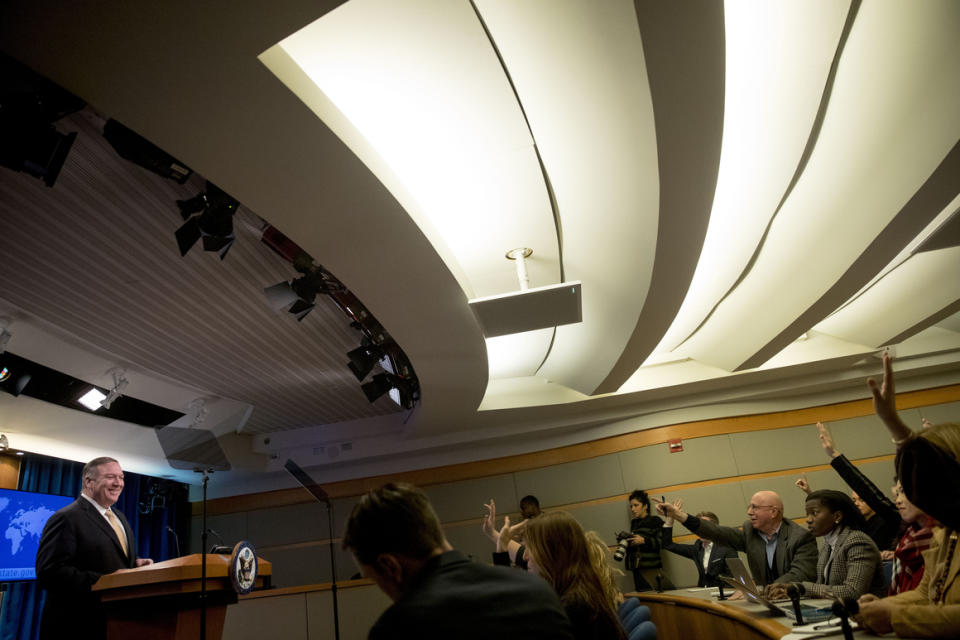Pompeo bends toward Israel with new U.S. stance toward settlements
Secretary of State Mike Pompeo announced Monday that the Trump administration would ease its stance on U.S. policy toward Israel, rejecting a 1978 State Department legal opinion that categorically calls Israeli settlements in the occupied West Bank "inconsistent with international law."
In an address at the State Department, Pompeo stated that the decision, which is a major boon to Israel and is sure to spark outrage from Palestinians, was not made lightly.
"The conclusion that we will no longer recognize as per se inconsistent with international law is based on the unique facts, history, and circumstances prevented by the establishment of civilian settlements in the West Bank," he said, adding that the administration "carefully" studied all sides of the legal debate surrounding the stance.
Pompeo argued that Israeli courts were equipped to resolve disputes on the legality of individual settlements, but also warned that the policy shift should not be viewed as the U.S. "prejudging the ultimate status of the West Bank."
That, he said, "is for the Israelis and Palestinians to negotiate."
It was a reversal from the Obama administration, which in December 2016 allowed the U.N. Security Council to adopt a resolution declaring settlement activity a "flagrant violation" of international law with "no legal validity." Pompeo framed the decision as confronting an inconsistency in U.S. policy, noting that shortly after the 1978 opinion from the Carter administration, President Ronald Reagan disagreed with that position just three years later.
"Subsequent administrations recognize that unrestrained settlement activity could be an obstacle to peace," he noted, pointing to the Obama administration move as a departure from that stance. But the shift is also a contrast with the position taken by the rest of the international community.
Just last week, a top European Union court ruled that member states must begin identifying products made in Israeli settlements by labeling them as such, a decision the State Department called deeply concerning. The EU also opposes Israeli settlement expansions, something that Pompeo’s announcement could help pave the way for.

Monday’s announcement is a welcome development for Israeli Prime Minister Benjamin Netanyahu, who is fighting for political survival after being unable to form a coalition government following two elections this year and facing legal issues.
The prime minister cheered Pompeo's announcement, posting a video on Twitter calling it a "historic day." In a separate pair of tweets, Netanyahu said he'd spoken to President Donald Trump on the phone, thanking Trump telling him that he'd "corrected a historic injustice."
Netanyahu's chief rival in the most recent Israeli elections, Benny Gantz, also applauded the Trump administration. In a tweet, he said that the administration's announcement showed its support of Israel, while reiterating his belief that "the fate of the settlements should be determined by agreements that meet security requirements and promote peace."
But advocates of the two-state model slammed the administration. J Street, a left-leaning Jewish advocacy group that supports the two-state model, accused the administration of "discarding decades of bipartisan US policy & flagrantly disregarding international law" while "trampling on the rights of Palestinians & helping the Israeli right wing destroy Israel’s future as a democratic homeland for the Jewish people."
Israel Policy Forum, a pro-two-state group, said they were "dismayed" by the announcement, arguing it would not only isolate Israel from the international community, but the U.S. as well.
"It just shows that this administration is completely out of step with where the international community is and with where our own policy consistently since 1967 has been," said Gerald Feierstein, a former senior State Department official who dealt with Middle East issues. "The reality is that the settlements are a clear violation of international law and nobody else in the world is going to be influenced by a statement to the contrary."
The announcement is simply the latest step the Trump administration has taken to assuage the Israeli government while pressuring the Palestinians. Critics say the moves have dramatically undermined the viability of a future two-state solution by ignoring Palestinian claims to territory.
The moves have included recognizing Jerusalem as the capital of Israel, ending foreign aid to the Palestinians, shuttering the Palestinians' office in Washington, and recognizing Israel's annexation of the Golan Heights, which is claimed by Syria. The administration has also stopped referring to the West Bank as being "occupied" and tried to redefine who counts as a Palestinian refugee.
Perhaps the clearest signal that the Trump administration is not interested in a future Palestinian state is that the elements of its Middle East peace plan put forward by Trump son-in-law and adviser Jared Kushner do not refer to a two-state solution. Instead, the section of the Kushner plan revealed so far has focused on economics and promising the Palestinians a brighter material future if not political rights.
Pompeo asserted Monday that the move was taken in part because "calling the establishment of civilian settlements inconsistent with international law hasn't worked, hasn't advanced the cause of peace." He added that a "complex political problem" remains, but said that while the U.S. will continue to help facilitate peace between the two sides, Israel and the Palestinians needed to negotiate between themselves.
"The hard truth is, there will never be a judicial resolution to the conflict in arguments about who was right and wrong as a matter of international law, will not bring peace," Pompeo said Monday.
But as testament to how polarizing Monday's decision is, the U.S. Embassy in Israel issued a security alert warning U.S. citizens in or traveling through Jerusalem, the West Bank or Gaza to exercise caution and urging heightened awareness, explicitly citing Pompeo's announcement and the potential for retaliation by opponents of the shift.

